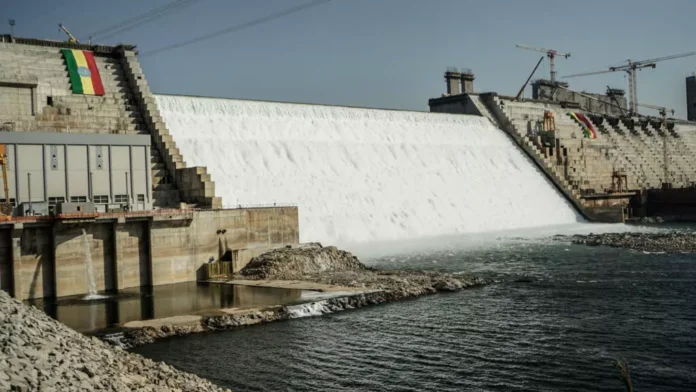Ethiopia has completed construction of the Grand Ethiopian Renaissance Dam (GERD), with the government announcing that the official inauguration will take place in September. This comes amid ongoing disputes between Addis Ababa, Egypt, and Sudan over the project’s impact on water security and Nile water shares. Egypt has condemned Ethiopia’s move, firmly rejecting “any attempts for Ethiopia’s development to come at the expense of the rights of the downstream countries.”
Ethiopian Prime Minister Abiy Ahmed confirmed on Thursday that construction of the controversial dam on the Blue Nile is finished, stating the official inauguration is scheduled for September. Ethiopia’s announcement prompted condemnation from Egypt, which described the move as a “unilateral measure.”
Addressing parliament, Abiy Ahmed said: “The work on the dam is now complete and we are preparing for its official inauguration.” He added: “To our downstream neighbors, Egypt and Sudan, our message is clear: the Renaissance Dam is not a threat, but a shared opportunity.”
Egypt’s Minister of Water Resources and Irrigation, Hani Sewilam, responded to the Ethiopian Prime Minister’s announcement by stating that Cairo “categorically rejects any attempts for Ethiopia’s development to come at the expense of the rights of the downstream countries.” Sewilam accused Ethiopia of trying to “impose a fait accompli” and of “evasion and backtracking” instead of engaging in genuine negotiations.
Construction of the dam began in 2011 with a budget of $4 billion, making it Africa’s largest hydroelectric project. The dam spans 1.8 kilometers and stands 145 meters high. Addis Ababa views the project as essential to meeting the country’s growing electricity needs, with a population of about 130 million.
However, the dam has long been a source of tension with Egypt and Sudan, both of which have expressed growing concerns about its impact on their shares of Nile water. Ethiopia began generating electricity from the dam, located in the northwest about 30 kilometers from the Sudanese border, in February 2022. The dam’s reservoir can hold up to 74 billion cubic meters of water and is capable of generating over 5,000 megawatts of electricity, more than doubling Ethiopia’s current output.
Egyptian and Sudanese sources continue to object to the dam’s operation without a trilateral agreement. Egypt, which suffers from water scarcity, considers the dam an existential threat, as it relies on the Nile for 97% of its water needs.
Egyptian President Abdel Fattah el-Sisi and Sudanese army chief Abdel Fattah al-Burhan held a meeting in which they “rejected unilateral measures in the Blue Nile Basin” and stressed the importance of “continued coordination and joint action to protect water security” in the region.
Prime Minister Abiy Ahmed reiterated Ethiopia’s readiness for constructive cooperation, stating that the project “will not come at the expense of either Egypt or Sudan.” He added: “We believe in shared progress, shared energy, and shared water. Prosperity for one should mean prosperity for all”


